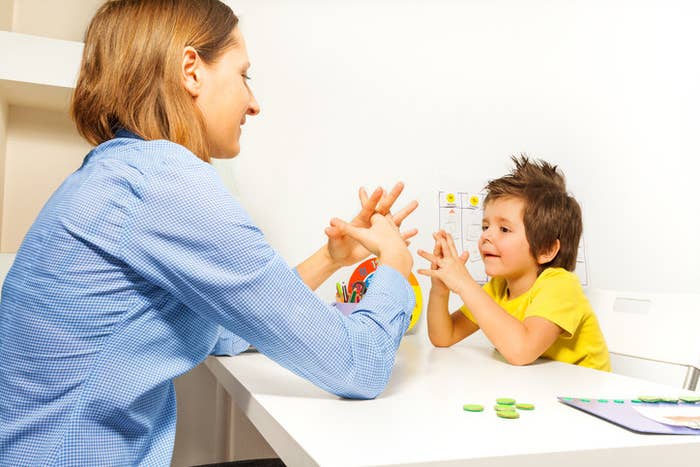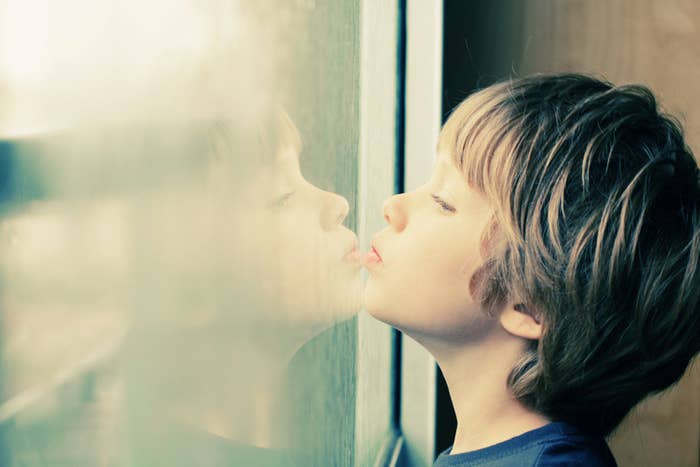
Teaching parents new ways of interacting with their autistic children has been shown to help reduce the severity of the children’s symptoms for up to six years after the treatment finishes, according to a new study.
The Preschool Autism Communication Trial (PACT), carried out by researchers at Manchester University, Newcastle University, and King’s College London (KCL) and published in The Lancet, is being hailed as the first intervention to show, in a well-designed scientific study, long-term benefits of this kind for autistic children.
About 1 child in every 100 is diagnosed with autism, which is characterised by difficulties in social communication and interaction, and repetitive movements and behaviours.
A total of 152 autistic children, all but 14 of them boys, were randomly divided into two groups: the PACT group and a “treatment as usual” group. The PACT intervention involved teaching parents of children aged between 2 and 4 “super-parenting” skills, by showing them videos of their interactions with their children in 12 two-hour sessions over six months, plus 20-30 minutes’ “homework” each day, with support sessions for a further six months, alongside standard treatment. The study then revisited the families almost six years after the end of the trial to see whether there had been a long-term impact.
Dr Catherine Aldred, a consultant speech and language therapist at Manchester who worked on the trial, told a press briefing that parents were videoed playing with their child for 10 minutes and then given detailed feedback with a therapist to help them better understand their child’s attempts to communicate. “If the child moves towards the parent or moves a toy towards the parent, we look to see if the parent starts to engage in play with the child,” she said. “Or if the child vocalises that it wants a toy from the toy box, we show the parent how they responded.”
The parents were then given goals, such as saying the name of an object when the child reaches for that object, or playing with the child when the child shows the parent a toy. The hope was that it would first change the parent’s behaviour with the child, then the child’s behaviour with the parent, and finally the child’s behaviour with others.

The study found that some of the key symptoms of autism – repetitive behaviours and difficulties with social communication – were reduced even on long-term follow-up in the PACT group compared to the control, although other indicators, including language skills and mental health, showed no change. At six-year follow-up, 46% of the children in the PACT group showed “severe” symptoms, compared to 63% of controls.
Jonathan Green, a professor of child and adolescent psychiatry at Manchester who led the study, told the briefing: “Such long-lasting effects are pretty remarkable for a psychosocial interaction. It’s certainly the first time it’s been seen in autism.”
“It’s an important study,” Mark Johnson, a professor of cognitive neuroscience at Birkbeck, University of London, who did not work on the study, told BuzzFeed News. “This is one of the first gold-standard rock-sold RCTs [randomised controlled trials] that have shown an effect. There have been other studies, but they’ve been smaller and not as high-quality.”
Richard Mills, research director at Research Autism, who also did not work on the study, agreed, telling BuzzFeed News the PACT study “was one of very few studies that’s well-designed”. “There are lots of studies that claim fantastic results,” he said, “but they’re either very small, or they have a high risk of bias or other methodological issues.
“This is one of the best designed studies there is on this topic. It’s the first really high-quality study. I do think it’s exciting.”
Green stressed that “it clearly doesn’t cure autism. It’s not a cure, it’s nothing magic, but it has a sustained reduction in severity and that’s important for families.” Johnson said it was a “moderate” effect, rather than a major one.
The study’s authors stressed that the intervention was not about blaming parents for their children’s autism. “Working in this way with parents does not imply that there’s anything wrong with their parenting,” said Green. “Autism is primarily a problem in the child. It’s a highly heritable condition.” But, he said, the child’s difficulties communicating its needs to its parents make it harder for a parent to use their normal parenting skills.
“Typically, a developing child gives you a lot of feedback, instinctively,” said Aldred. “But a child with autism may not. So it’s about giving parents confidence, solving problems together, using the parent’s knowledge of the child. The parent might see the video and say, ‘Oh, now I know what he wanted; he wanted me to bounce him on his knee.’ As a stranger, I wouldn’t have known that.
“We’re trying to take the parent’s interaction with their child and taking it to a super level, because these children need something exceptional. They’re very vulnerable.”
The children in this trial were “at the severe end” of the autistic spectrum, said Green. Tony Charman, a professor of child psychology at KCL who worked on the study, told BuzzFeed News that this meant it was easier to diagnose them at an early age than other children with less severe symptoms. That in turn made it possible to get them into the trial before the age of 4.
Lots of children, especially those with less severe symptoms, aren’t diagnosed until later, according to Johnson. “In reality, lots of kids aren’t being picked up until 4 or 5,” he said. “By then the syndrome is well-established, and it’s harder to treat.”
But, he said, that’s partly because “there’s no point of getting early diagnosis if you haven’t got something to treat them with”. “Part of the reason kids don’t get picked up earlier is that even if you were to diagnose them at 2 or 3 there’s not a lot on offer for them,” he said. The results of the PACT study would provide greater incentives to achieve early diagnoses, he said, because now therapists have something to offer parents.
Charman agreed, saying that although there are already good reasons to get early diagnosis – “parents are often at a complete loss, and diagnosis and education is helpful for them” – the study “definitely adds to the need" for one. “It allows specific treatment, which there hasn’t been much of for autism,” he said.
Green said the intervention was designed to be useful to the NHS as a more efficient use of therapists’ time. Treatment and support for an autistic child costs families and society an average of about £1 million to £1.5 million over the course of that child’s lifetime, he said.
